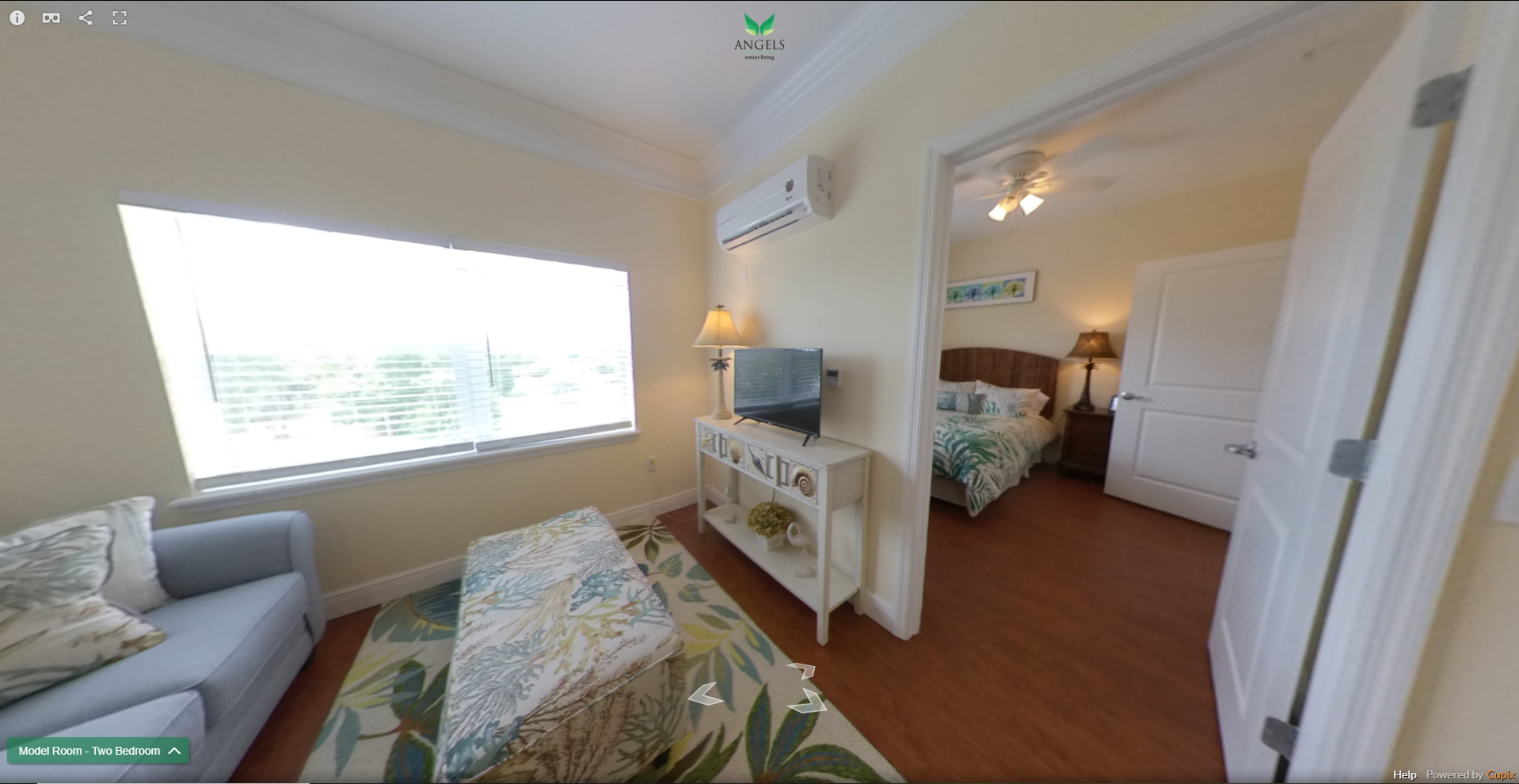Angels Senior Living is thrilled to share our newest resource for seniors and their families, 360° tours! These tours are currently available at our Sarasota, The Lodges of Idlewild, and South Tampa communities, with more on the way. In spite of COVID-19, we’ve continued to see a lot of interest in assisted living. This makes things very tough for us because our mission is to help seniors find their new home, and this starts with getting to see it with your own eyes. Right now, we’ve restricted community visitation by order of the Florida governor, but Angels Senior Living and the state of Florida have taken steps to ensure we can safely admit new residents. Check out the details on our new tours below to learn more.
We’re Still Accepting Move-Ins at All of Our Communities
Seniors can still move in at all of our assisted living facilities! Health care providers assessing seniors with Form 1823 must include a declaration that the senior is free from COVID-19 prior to moving into a facility. We also conduct our own symptoms and history review when seniors arrive at their new homes. From there, new residents will remain quarantined in their rooms for two weeks. This can be daunting, but our staff makes sure to take extra care of our new family members. You can also bring your furniture, pets, and keepsakes as always. This way, your new home will remind you of your old home right away!
Unfortunately, family members can’t enter our facilities while COVID-19 restrictions are in effect. Dropping your loved one off at our door may seem uncaring to some, and is obviously a difficult situation. But in some cases, a safe, COVID-19-free assisted living facility is the best option for your loved one right now. Take one of our 360° tours for a spin and we’re sure you can find a reason to love any of our communities!
Benefits of 360° Tours in Assisted Living
A 360° tour allows you to get a total feel for a building or space without actually visiting it. Things may look a little quiet at our communities now due to coronavirus, but this gives you the opportunity to take a full look at the layout and amenities we offer at each of our facilities. You can also find photos of our cuisine and our social life on each community page. This should give you a comprehensive look at what you can expect at each of our facilities, and hopefully ease some of the concerns about moving in.
Each community’s virtual tour also includes our model rooms, so you can get a firsthand look at how beautiful your new home can become!
Currently available tours:
Angels Senior Living at Sarasota
Angels Senior Living at South Tampa
Angels Senior Living at The Lodges of Idlewild
Angels Senior Living at New Tampa
Tours coming soon:
Angels Senior Living at Palma Ceia
Angels Senior Living at Connerton Court
Need Assisted Living Now? We’re Waiving Our Service Initiation Fees During COVID-19 Due to Lack of Quality Care
Florida is still a couple of weeks out from its peak in hospitalizations, but the stress on our health care industry is already evident at hospitals across Florida and in the Tampa Bay Area. Hospitals are converting space into intensive care units (ICUs), many of which are already in use. They’re storing more medication and respirators than normal, and city and county officials have taken steps like ordering social distancing to cut down on new infections. Additionally, several assisted living facilities have gotten into the news because of their mismanagement of COVID-19 and failure to adapt to the situation. Even worse still, some home health agencies and assisted living facilities haven’t ordered or received emergency supplies of personal protective equipment (PPE), or fail to address and protect against COVID-19 in other ways. These circumstances are hopefully few and far between but have cropped up in the news lately.
Angels Senior Living is committed to protecting our seniors and our staff like our own family. We don’t want anyone to get sick, and we both encourage our staff to keep an open dialogue with us about any symptoms they experience and require them to quarantine themselves in the event those symptoms appear. To that end, we’re waiving our service initiation fees at all of our communities to ensure seniors can receive quality care from a responsible provider during a crisis. This could mean savings of up to $5,000 or more depending on your desired facility. Reach out to us today at (877) 480-2244 for more information.
Rest assured that Angels Senior Living will continue to take appropriate precautions to prevent COVID-19 infections in our communities, and will let our residents and their families know if any of our residents or staff receive a COVID-19 diagnosis.
__________
COVID-19 Resources
Angels Senior Living Update on COVID-19
Strategies to Prevent the Spread of Coronavirus (COVID-19)
What to do if you are sick with coronavirus disease 2019 (COVID-19)






